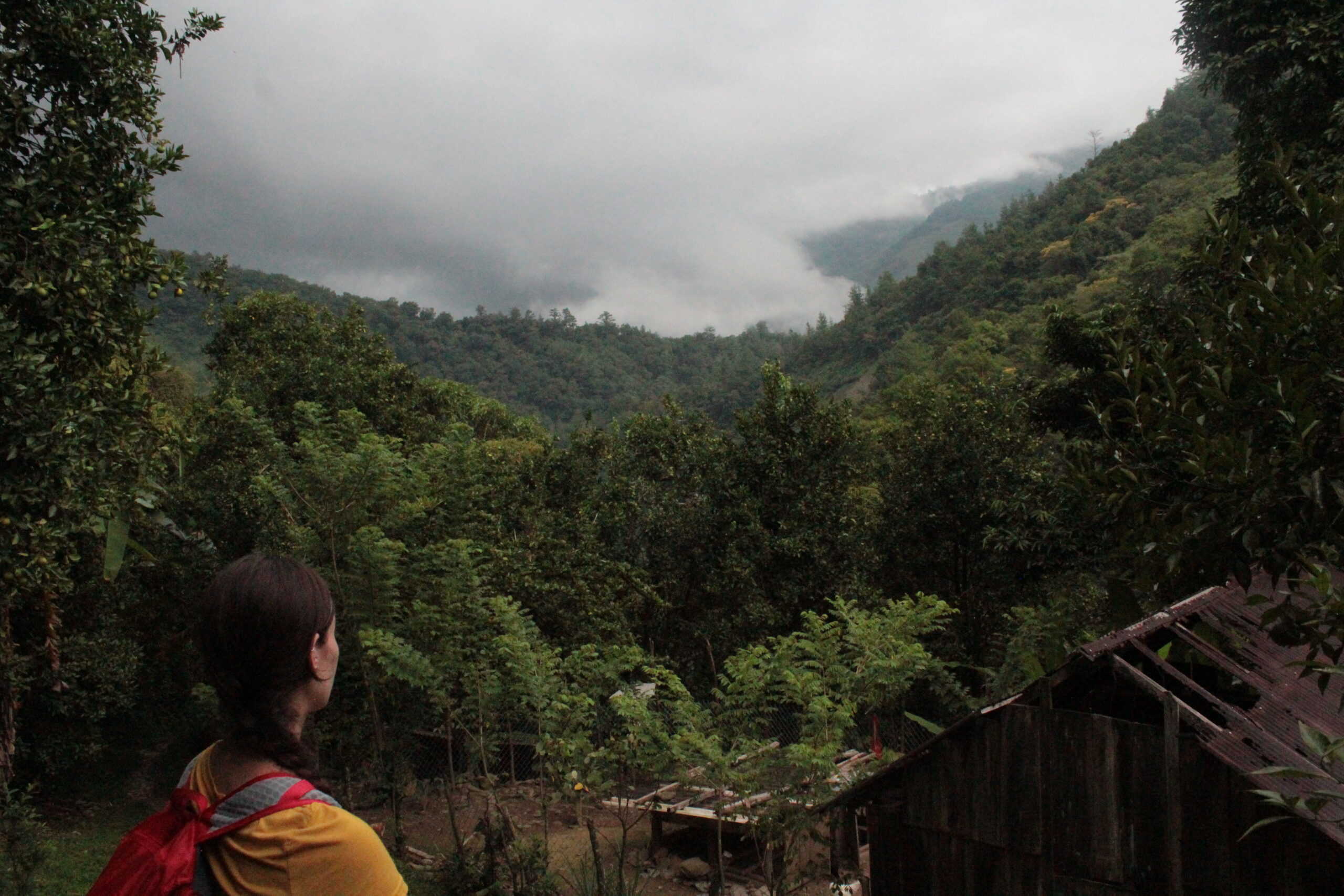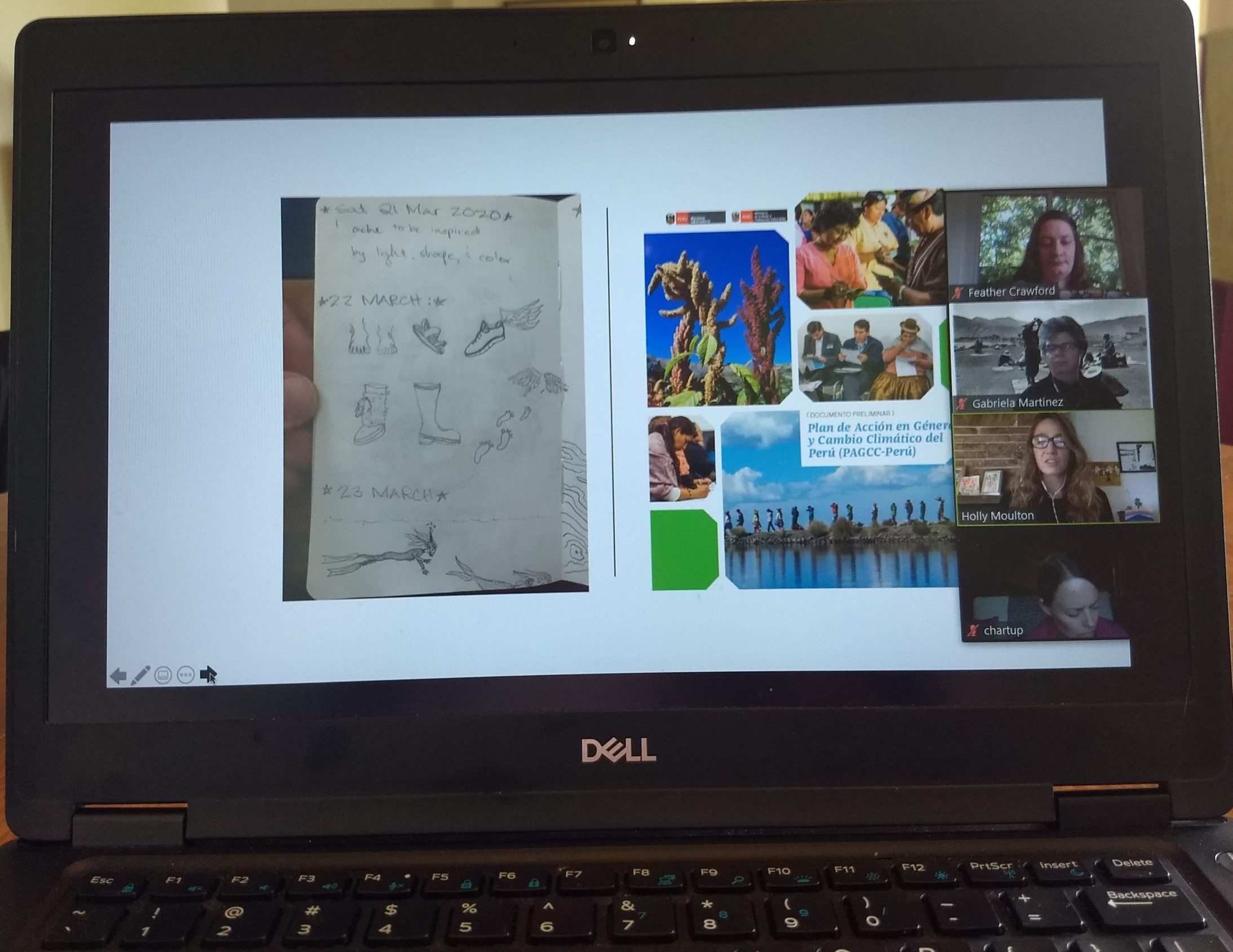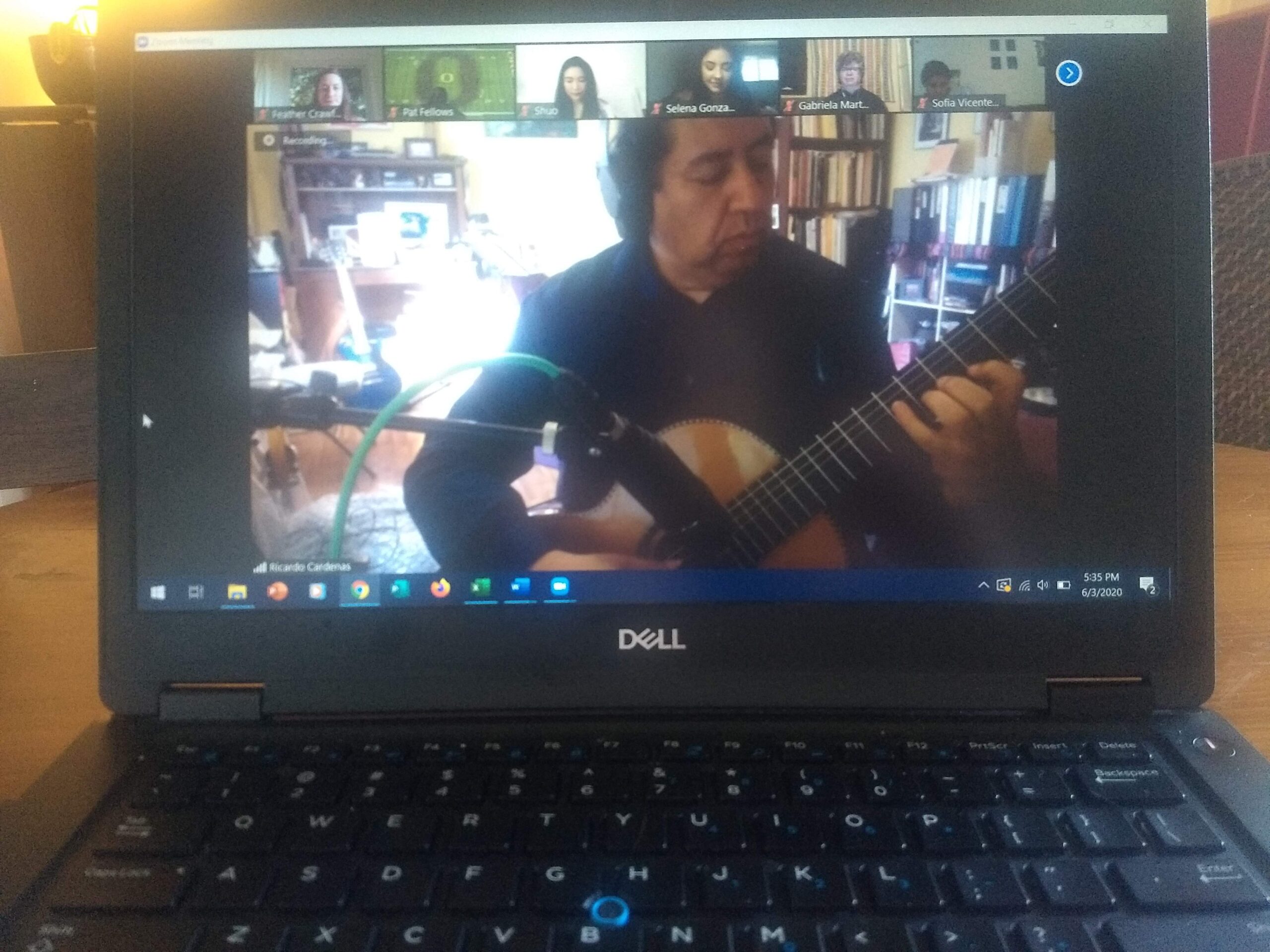Climate change effects on tropical cloud forests and coffee farms: a social-ecological study
By Adriana Uscanga Castillo

My field research centers on the Chinantec region in the Mexican state of Oaxaca. This region harbors one of the most biodiverse tropical forests in the country. This landscape is a mosaic of large patches of cloud forest embedded in a matrix of coffee plantations and maize plots which, along with the capricious topography and the cultural and socioeconomic history, create a complex socioecological system. Four communities of the Chinantec region are organized collectively in a forest conservation project known as Comité de Recursos Naturales de la Chinantla Alta (CORENCHI), which has carried out actions that over time have resulted in greater forest cover in the area.
I conducted initial fieldwork in this region in September 2019. My main objective was to establish connections with Chinantec community members and CORENCHI, as well as to evaluate the feasibility of my project and the interest or lack thereof that local people could have on the effects of climate change. The Tinker Field Research Grant helped me to accomplish the following particular objectives: (1) visit three communities in the Chinantec region that are involved in CORENCHI: Santa Cruz Tepetotutla, San Antonio del Barrio, and San Pedro Tlatepusco; (2) Introduce myself to CORENCHI’s president and to other members of CORENCHI; (3) document information about smallholders’ experiences in relation to agricultural production, especially concerning coffee, forest conservation, and climatic changes; (4) determine the most convenient ways of transportation, lodging, and eating in the area for future research stays.
Arriving to the Chinantec region all the way from Eugene involved several flights, buses, and a local special transport that runs among towns in the mountain range and must be booked in advance. I was lucky to be accompanied by a local guide that has worked in the region for several years now and knows people from the community, as well as the best means of transportation. During my stay in the region I met the president of CORENCHI, went to the main office in each community to introduce myself, and talked about my intention of doing research in the region.
Besides talking to the local authorities and asking for permission to conduct my research, I had the opportunity to visit some of the coffee farms, the patches of conserved forests, and maize plots. I was surprised to see how people manage to grow coffee and annual crops in such steep slopes. Although one of my objectives was to talk to coffee producers about their perspectives on climate change and their strategies for climate change adaptation, other topics seemed more important to them which drew our conversations into other matters.
Some topics that came out recurrently were, for instance, problems with the coffee rust and the international price of coffee. This finding resonates with research showing that small-scale coffee farmers are usually more concerned about problems directly related to yield and price, and less so about medium- to long-term problems, as climate change is currently considered. I also found that local people are interested in knowing about the carbon stocks and biodiversity present in their coffee farms, and realized that data about temperature, precipitation, or streamflow is not available at local scales.
These findings have shaped my work moving forward. First, the fact that climatic data is not available closed the possibility of assessing climatic changes at local scales. However, other interesting options arose, like assessing changes in carbon stocks. Furthermore, I realized that learning about the current effects of anthropogenic climate change will probably require a different approach than simply asking whether temperature and precipitation have been changing and affecting people’s lives.
Understanding climate change effects and people’s adaptation strategies requires an approach rooted in daily living experiences. Regardless of whether I will be able to assess this last point, doing fieldwork last summer was fundamental for clarifying the feasibility and scope of my project and to broaden my understanding of the small-scale coffee farmers’ reality in the Chinantec region.
————————————————————————————————————–
About the author
Adriana Uscanga is a PhD candidate in the Department of Geography working in the Soil-Plant-Atmosphere research lab. She’s interested in the ecology of tropical landscapes and her research focuses on the interaction between land-use change and climate change and their effects on tropical montane forests. Adriana is currently studying carbon and water relations in cloud forests and coffee farms in Mexico.
Winter-spring Events Recap
By Feather Crawford, CLLAS Events Coordinator
While 2020 started with a full event calendar for CLLAS, unpredictable and unprecedented conditions brought dramatic changes for all of us. Here are some highlights.
On January 21, we hosted the CLLAS Winter graduate student colloquium, Gender and Sexuality in Latin America in the Knight Library Browsing Room. Jon Jaramillo, from Romance Languages, spoke about gendered minority community formation in Chile and Argentina, Polet Campos-Melchor, from Anthropology, spoke about LGBTQ+ migrants on the U.S.-Mexico Border and their strategies of love and survival, and Emily Masucci, also from Anthropology, spoke about gender-based violence and justice in Rio de Janeiro, Brazil.
In mid-February, CLLAS collaborated with the College of Education to host Bilingualism: Myths Abound! At this exciting event, students, community members, and educators packed the Gumwood Room in the EMU to share in the expertise of faculty researchers from the College of Education and the Department of Linguistics. Check out the PDFs of their presentations at https://cllas.uoregon.edu/bilingualism-myths-abound/and learn more about their research related to bilingualism at all stages of the lifespan.
On February 20, David J. Vázquez, UO Associate Professor and Head of Department of English and recipient of the CLLAS Latinx Studies Seed grant, gave a presentation of his research, entitled Decolonial Environmentalisms: Race, Genre and Latinx Culture. Professor Vázquez analyzed environmental representations in contemporary Latinx literature and culture that include decolonial and anti-racist forms of thought as well as environmentalism. But then our programming suddenly ceased for two months as we all adapted to the COVID-19 crisis.
By late-April, CLLAS began hosting virtual events on Zoom; this new medium has worked especially well for our final two graduate research colloquia. On April 30, 2020, faculty and graduate students from across campus attended Gender and Climate Crisis in the Americas. Holly Moulton, from Environmental Studies, spoke about the way women in the Peruvian Cordillera Blanca experience their proximity to dramatic ice-loss in that region of the Andes and Adriana Uscanga Castillo shared her research on small-scale farmer’s vulnerability to climate changes in the Chinantec Region, Mexico.

On May 26, in the final colloquium, entitled Politics and Justice in the Caribbean and Central America, Alberto Lioy, in Political Science, spoke about rapid political change and the 1994-1998 story of political collapse in Costa Rica and Carla Macal Montenegro discusses mourning and the search for justice for the 56 Guatemalan girls who were lost in the fire at Hogar Seguro Virgen de la Asunción. All four graduate students who shared their research over Zoom gave powerful presentations and benefited from robust Q & A and discussion with their virtual audiences!
CLLAS rounded out the academic year with two more successful virtual events. The Latino Roots Celebration drew almost one hundred guests on June 3 (more below) and showcased exceptional student work. Our final event on June 9, Remote Research: Sharing Ideas for Domestic and International Research During the Pandemic, was moderated by Professors Erin Beck (Political Science), Audrey Lucero (College of Education), and Lynn Stephen (Anthropology) and graduate student Emily Masucci (Anthropology) and featured important resources and ideas for carrying out research in the era of COVID19. The Zoom video and chat for this event can be accessed from the CLLAS website at https://cllas.uoregon.edu/remote-research-sharing-ideas-for-domestic-and-international-research-during-the-pandemic-2/.
Latino Roots

The fifth Latino Roots Celebration took place through Zoom on June 3, 2020. Students of the Latino Roots I & II courses presented their ethnographic documentaries to peers, faculty, staff, and community members.
The virtual events included:
- Guitar music by Ricardo Cárdenas
- Remarks by UO President Michael Schill, PCUN Executive Director Reyna López and Latino Roots students Emily Chávez Romero and Jackson McCormick
- Symbolic deposit of work in the library with Mark Watson-Interim Dean of Libraries
- Screening of documentaries and websites in Zoom breakout rooms
Professors Gabriela Martínez (SOJC) and Lynn Stephen (Anthropology) developed the courses Latino Roots I and Latino Roots II a decade ago. Latino Roots I focuses on giving a theoretical, documentary, and ethnographic understanding of the processes of Latino immigration and settlement in Oregon during the past 150 years. Latino Roots II teaches students how to produce a short video documentary from oral history interviews.
To view student documentaries and learn more about the Latino Roots courses and the traveling educational Latino Roots exhibit, please visit https://latinoroots.uoregon.edu/
CLLAS to Host Symposium on Languages and Diaspora in Spring 2021
CLLAS will be hosting its third symposium during spring 2021. The tentative title of the symposium is “Languages on the Move.” The focus will be on linguistic diaspora, indigenous languages, other forms of language (i.e music, audiovisal-films/TV/other), and the politics of language in the Americas. The symposium will be a 1-2 day event during week 4 or 5 of spring term next year.
CLLAS is still working on the details but panel topics may include:
- Languages in the Pacific Northwest
- Encountering linguistic diasporas in Latin America
- Other types of language – music, visuals
- Political discourse
- Borders
- Education
CLLAS would also like the event to have a space for student research and engagement. Other potential activities include music and connections to art. The coordinating committee is Audrey Lucero from the College of Education, Monique Balbuena from the Honors College, and Gabriela Pérez Báez from the department of Linguistics. Please check back on our website at cllas.uoregon.edu for updates as next spring approaches.
2020-21 CLLAS Grant Recipients
CLLAS congratulates its graduate and faculty 2020-21 grant recipients, listed below.
Summer Graduate Research Grant Awards:
- Polet Campos-Melchor, Anthropology: “LGBTQ+ Migrants: Demystifying Love and Survival in Ciudad Juárez.”
- Lola Loustaunau, Sociology: “The hands that feed us: analyzing the experiences of migrant Latinas in food processing.”
Graduate Field Research Grants in Latin America:
- Lindsey Romero, Counseling Psychology: “Sanando las Heridas del Pasado: An Examination of Trauma Healing among Peruvians Post the 20-Year Period of Violence.”
- Annalise Gardella, Anthropology: “Visibility, Risk, and Violence: Face-to-Face and Online Organizing among El Salvador’s LGBT Organizations.”
- Alejandra García Isaza, Prevention Science: “Parenting through adversity: Barriers and facilitators of parent engagement among Buen Comienzo families.”
Faculty Latinx Studies Seed Grant Award:
- Audrey Lucero, Associate Professor of Critical and Sociocultural Studies in Education: “Languaging While Comprehending.”
Faculty Research Seed Grant Awards:
- Stephanie Wood, Director of the Wired Humanities Project and Research Associate at the Center for Equity Promotion: “Visual Lexicon of Aztec Hieroglyphs.”
- John Arroyo, Assistant Professor in Planning, Public Policy and Management: Book project: “Shadow Suburbanism: Mexican Immigration, Urban Change, and Place in Greater Atlanta.”
